Record revealed
An Elizabethan widow's will
This ordinary will from 1587 gives us a glimpse of an Elizabethan woman’s concerns on her deathbed. It includes a word-for-word account of a conversation between mother and son.
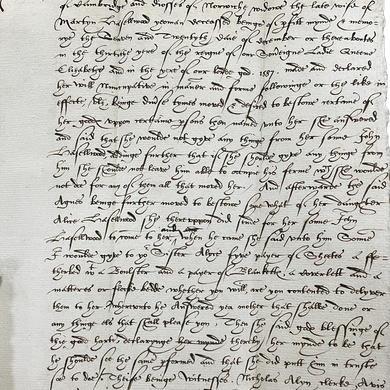
Image 1 of 3
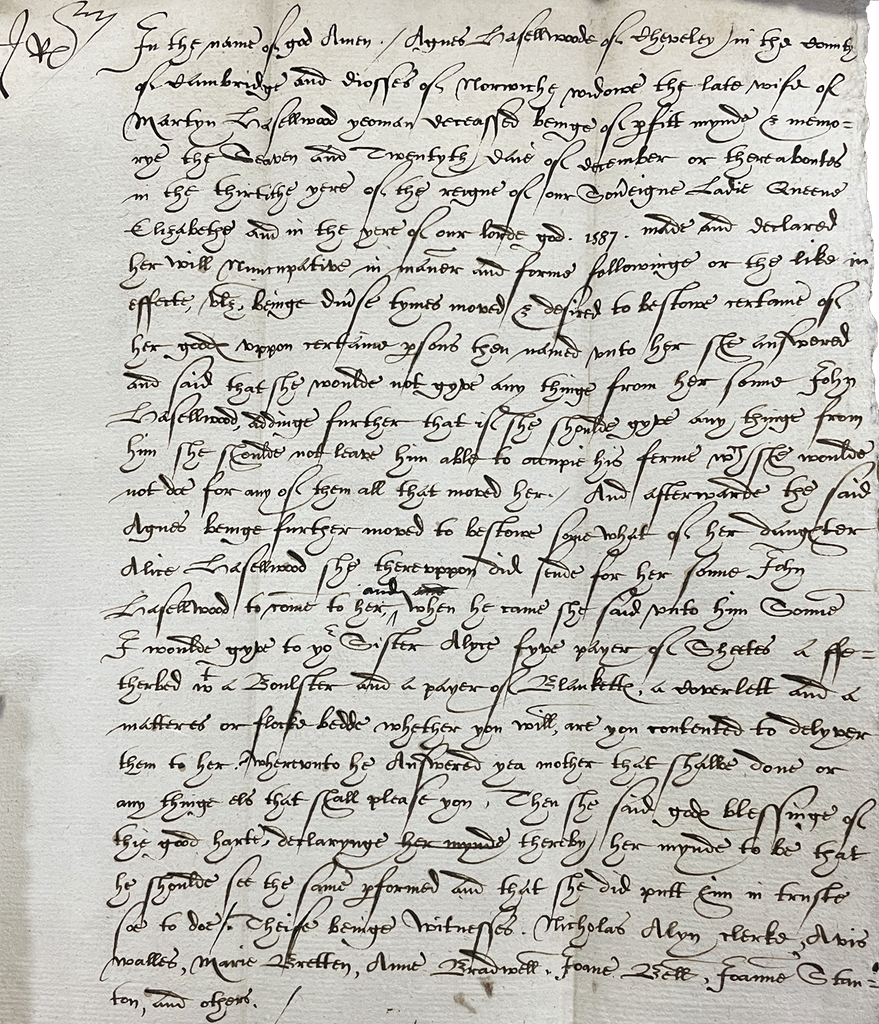
Original will of Agnes Haselwood, widow of Cheveley, Cambridgeshire.
Partial transcript
In the name of god Amen / Agnes Hasellwoode of Cheveley in the County of Cambridge and Diosses of Norwiche widowe the late wife of Martyn Hasellwood yeoman deceassed beinge of p[er]fitt mynde & memo= rye the Seaven and Twentyth Daie of December or thereaboutes in the thirtithe yere of the reigne of our Sov[er]eigne Ladie Queene Elizabethe and in the yere of our lorde god 1587 made and Declared her Will Nuncupative in man[n]er and forme followinge or the like in effecte, viz, beinge div[er]se tymes moved & desired to bestowe certaine of her goodes uppon certaine p[er]sons then named unto her she answered and said that she woulde not gyve any thinge from her sonne John Hasellwood, addinge further that if she shoulde gyve any thinge from him she shoulde not leave him able to occupie his ferme w[hi]ch she woulde not doe for any of them all that moved her./
And afterwarde the said Agnes ... did sende for her sonne John Hasellwood to come to her and when he came she said unto him Sonne I woulde gyve to yo[u]r Sister Alyce fyve payer of Sheetes a Fe= therbed w[i]t[h] a Boulster and a payer of Blankettes, a Coverlett and a matteres or flocke bedde whether you will, are you contented to delyver them to her? Whereunto he Answered yea mother that shalbe done or any thinge els that shall please you, Then she said godes blessinge of thie good harte, declarynge thereby her mynde to be that he shoulde see the same p[er]formed and that she did putt him in truste soe to doe.
Modern English
In the name of God Amen. Agnes Haselwood of Cheveley in the County of Cambridge and Diocese of Norwich, widow, the late wife of Martin Haselwood yeoman deceased, being of perfect mind and memory the 27th day or thereabouts in the 30th year of the reign of our Sovereign Lady Queen Elizabeth and in the year of our Lord God 1587 made and declared her will nuncupative in manner and form following or the like in effect, viz. being diverse times moved and desired to bestow certain of her goods upon certain persons then named unto her she answered and said that she would not give anything from her son John Haselwood, adding further that if she should give anything from him she should not leave him able to occupy his farm which she would not do for any of them all that moved her.
And afterwards the said Agnes being further moved to bestow somewhat on her daughter Alice Haselwood she thereupon did send for her son John Haselwood to come to her and when he came she said unto him “Son I would give to your sister Alice five pairs of sheets a featherbed with a bolster and a pair of blankets, a coverlet and a mattress or flockbed whether you will. Are you contented to deliver them to her?” Whereunto he answered “Yea mother that shall be done or anything else that shall please you”. Then she said “God’s blessing of thy good heart”, declaring thereby her mind to be that he should see the same performed and that she did put him in trust so to do.
Image 2 of 3
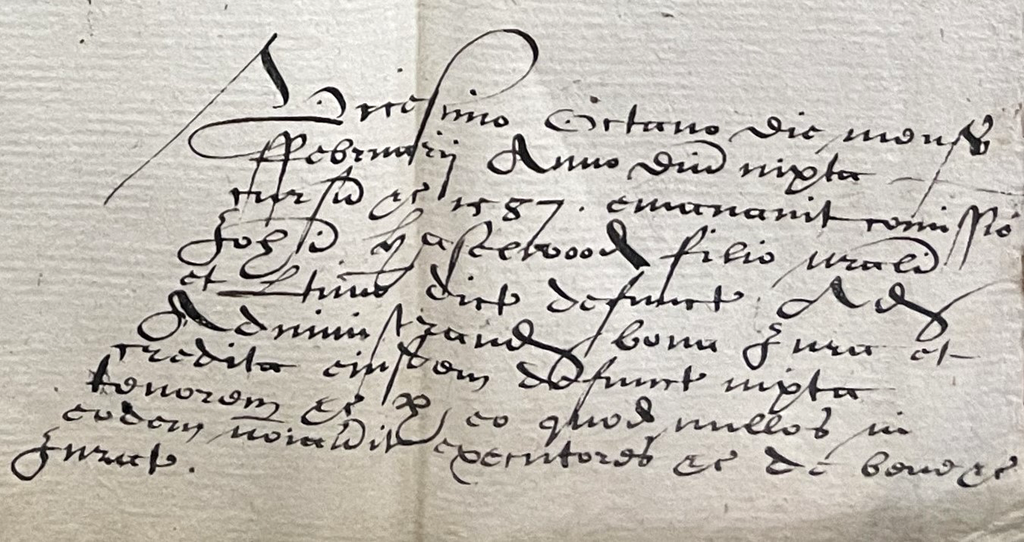
Annotation indicating that John Haselwood has been appointed administrator of his mother’s estate.
Image 3 of 3
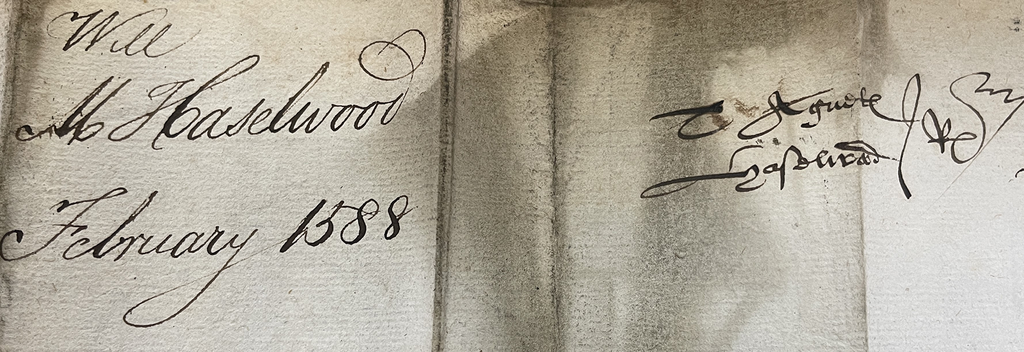
Later filing note on the back of the will (left), mistakenly calling it the will of M Haselwood, whereas the marginal entry in Latin (right) indicates it is Agnes'.
Why this record matters
Date: 27 December 1587
The National Archives holds a collection of over a million wills proved in the Prerogative Court of Canterbury between 1384 and 1858. Each one tells a story of one individual and their network of family and friends.
There are many women’s wills, mainly those of spinsters and widows. Married women could not usually bequeath property until the Married Women’s Property Acts of 1870 and 1882.
This will, spoken on her deathbed on 27 December 1587 by Agnes Haselwood of Cheveley in Cambridgeshire, is unusual in that Agnes had only been a widow for one or two days. Her husband Martin’s will was written on Christmas Day.
Martin’s will is fairly typical of wills from this period. It states he was ‘sound of mind’ but does not mention his bodily health, and lists bequests to a range of people including his step-children from his wife’s first marriage. His will does not project the same sense of imminent death as that of Agnes.
Agnes’s will is in a very different style. It is a nuncupative will, meaning that she spoke her wishes in front of witnesses, as there was no time to have them formally recorded in writing before she died. Of particular interest is the number of women who were present in her final hours, with five of them signing the will as witnesses. The one male witness – Nicholas Alyn (or Allen), a clergyman and Agnes’s son by her first marriage – probably acted as scribe.
It is apparent that Agnes was overwhelmingly concerned about her son John Haselwood and his financial security on his farm. This meant she was resistant to suggestions that any of her belongings should be given to anyone else. However, as her illness progressed, she changed her mind and sent for her son to ask him for his permission to leave some bedding to her daughter, Alice instead. The exchange between mother and son is recorded verbatim (in the transcript above) – a rare glimpse of such an interaction in 16th-century England.
Agnes and her husband, Martin, were both buried in Cheveley on 29 December 1587. It is possible they both fell victim to the bubonic plague which was circulating in England between 1585 and 1587. Both wills were brought into the Prerogative Court of Canterbury on 28 February 1588 by John Haselwood.
John did not survive to enjoy his farm for long – he was buried in Cheveley on 24 October 1589 and his will was proved a week later.
Blogs and podcasts
-
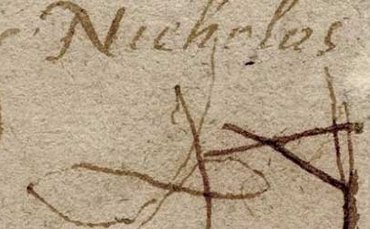
Blog: The poignant last will and testament of Nicholas Hilliard
By Elizabeth Goldring – 30 April 2019
Nicholas Hilliard – goldsmith, portrait painter, royal servant – was buried in St Martin-in-the-Fields, at the western end of London’s Strand, on 7 January 1619. What does his will reveal?
-
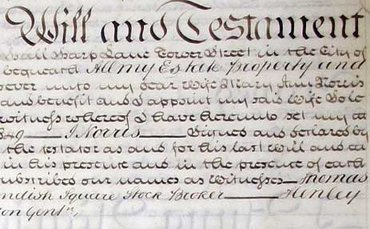
Podcast: Introduction to wills
By Matt Norman and Nigel Taylor – 1 April 2020
Who would have left a will? What information can you find in them? Are they all at The National Archives? Find out the answers in this short podcast.
-
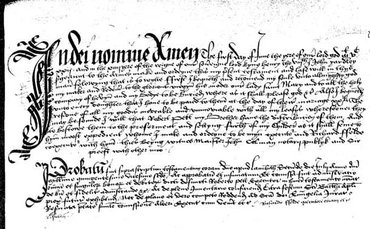
Research guide: Wills 1384-1858
By The National Archives – 23 March 2015
Discover how to search wills proved by the Prerogative Court of Canterbury, covering the south of England and Wales.